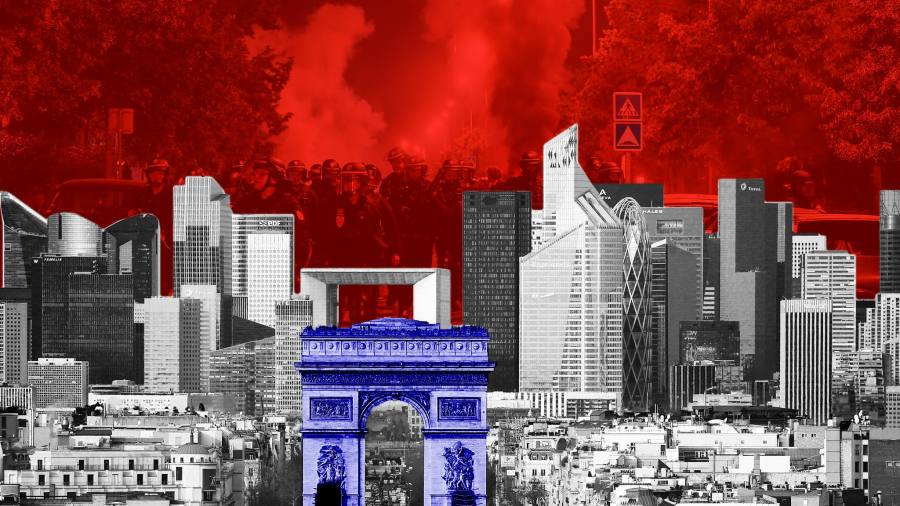Receive free French politics updates
We’ll send you a myFT Daily Digest email rounding up the latest French politics news every morning.
More than has been the case for many years, France appears deeply divided. Last week’s police killing of a teenage driver of North African descent triggered unrest across the country, with stark images of cities ablaze providing evidence of anti-government sentiment caused by a range of inequality issues.
President Emmanuel Macron has been accused of neglecting a pledge to narrow the racial and economic divide. Only a few miles from the poor Paris suburb where the shooting took place, the French financial sector has been booming, as Macron followed through on another promise — to ensure Paris could boast financial dynamism akin to London’s.
While Brexit has sapped the chutzpah of the City, Macron, a former banker, has been explicit on plans to make the most of the UK’s forsaken status as the financial springboard into Europe. “When Macron took over six years ago he had a clear strategy,” says one finance ministry official. “The goal was to be the main beneficiary of Brexit.”
And so it has transpired. France’s most dramatic gain in financial services has come via the big five US investment banks, which have moved at least 1,600 staff to Paris, according to Financial Times calculations. In 2021, an annual EY study found France overtook the UK in terms of the number of US financial services foreign direct investment projects directed at Europe, accounting for 19 schemes, versus the UK’s 17.
If traders needed to move to the eurozone, Paris was always going to be an appealing location. But specific policies have spurred the trend. Officials describe a three-pillar strategy.
The first was focused on tax reform. While the UK has just raised its ultra-low 19 per cent corporate tax rate to 25 per cent, France has been slashing its own in recent years from 33 per cent, also to 25 per cent. There have been personal tax discounts of up to 50 per cent for foreign executives and longtime expats who return home. The result has been a global influx of executives: Bank of America in Paris, for example, today employs about 600 staff (up from 70 a few years ago) from 49 different countries.
Macron’s second pillar related to competitiveness. Alongside the controversial but crucial pensions overhaul to raise the retirement age from 62 to 64, a suite of labour market reforms aim to make hiring, firing and employment terms more flexible.
The third draw has been political stability. Macron can hardly claim deep personal popularity these days. But his presidency is set to carry him through to 2027 and his finance minister, Bruno Le Maire, has been in the role for six years. Frustrated financiers contrast that with the flip-flopping of UK policy, prime ministers and chancellors over the past year.
If the carrots are appealing, there is also a stick. The European Central Bank has been firm in demanding the steady relocation to eurozone locations of staff concerned with eurozone business. French officials say the ECB’s recent fining of Goldman Sachs, for misstating its risk capital, is likely to be used as a lever to oblige banks to relocate more senior risk management executives to the region.
At the same time France has been working to attract asset management firms. A clutch of hedge funds, including Citadel, Millennium and Point72, has already announced office expansions. A bigger prize may beckon if Britain’s Labour party wins power and proceeds with tax plans that would hit the private equity industry: many buyout executives working in London hail from France and the eurozone and Macron is sure to try to lure them.
Bank traders admit that the level of assets under management drawn to Paris has not matched expectations. Another disappointment has been the fall back in inward investment, according to EY data. Following France’s record 2021 performance, the UK returned to the clear number one spot for US financial services FDI in 2022 and is a far bigger financial centre overall. And France’s enthusiasm for cutting-edge finance has led it into risky situations. Binance, the controversial crypto exchange, chose Paris as its European hub last year, but has since been sued by the US Securities and Exchange Commission.
Perhaps the biggest risk of all, though, is societal. The financial sector’s expansion — reflected in the growing influence of Anglo-American pay norms — magnifies the gulf between the haves and have-nots. That has long been a source of friction in the UK. How much worse will it go down in Macron’s increasingly polarised France?
Read the full article here




